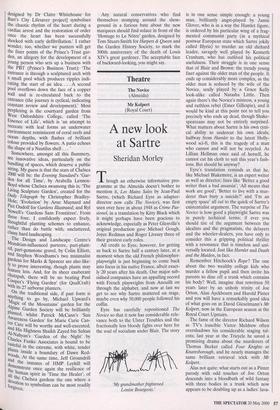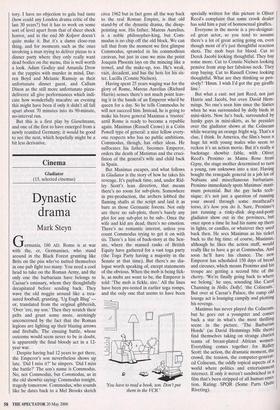Theatre
The Novice (Almeida) Mr Kolpert (Royal Court)
A new look at Sartre
Sheridan Morley
Though an otherwise informative pro- gramme at the Almeida doesn't bother to mention it, Les Mains Sales by Jean-Paul Sartre, (which Richard Eyre as adapter- director now calls The Novice), was first seen over here in about 1948 as Crime Pas- sionel, in a translation by Kitty Black which it might perhaps have been gracious to acknowledge, especially as Peter Glenville's original production gave Michael Gough, Joyce Redman and Roger Livesey three of their greatest early roles.
All credit to Eyre, however, for getting us back to Sartre half a century later, at a moment when the old French philosopher- playwright is just beginning to come back into focus in his native France, albeit exact- ly 20 years after his death. Our major sub- sidised companies have an appalling record with French playwrights from Anouilh on through the alphabet, and now at last we get to see why Sartre mattered on stage, maybe even why 50,000 people followed his coffin.
Eyre has carefully repositioned The Novice so that it now has considerable rele- vance both to the Ulster Troubles and the fractionally less bloody fights over here for the soul of socialism under Blair. The story My grandmother frightened Louise Bourgeois.' is in one sense simple enough: a young man, brilliantly angst-played by Jamie Glover, who is in a way the Hamlet figure, is ordered by his particular wing of a frag- mented communist party (in a mythical postwar European state which Sartre jokily called Myna) to murder an old diehard leader, savagely well played by Kenneth Cranham, who has outlived his political usefulness. Their struggle is in one sense that of Blair and Brown: the trendy young fixer against the older man of the people. It ends up considerably more complex, as the older man is seduced by the wife of the Novice, sexily played by a Grace Kelly look-alike called Natasha Little. Then again there's the Novice's mistress, a young and ruthless rebel (Emer Gillespie), and it would be kind at this point not to tell you precisely who ends up dead, though Shake- speareans may not be entirely surprised. What matters about Sartre is his own cyni- cal ability to undercut his own ideals; halfway from Hamlet to the latest Holly- wood sci-fi, this is the tragedy of a man who cannot and will not be recycled. As Lillian Hellman once said of herself, he cannot cut his cloth to suit this year's fash- ions. But should he anyway?
Eyre's translation reminds us that he, like Michael Blakemore, is an expert writer as well as director; lines like 'Better a good writer than a bad assassin'; 'All means that work are good'; 'Better to live with a mur- derer than bury a suicide?' and 'I'm an empty space' all cut to the quick of Sartre's existentialist argument. The surprise of The Novice is how good a playwright Sartre was in purely technical terms; if ever you should tire of the argument between the idealists and the pragmatists, the delayers and the wheeler-dealers, you have only to consider this a gripping political thriller with a resonance that is timeless and uni- versally located. Just like Hamlet and Death and the Maiden, in fact.
Remember Hitchcock's Rope? The one about the two wealthy college kids who murder a fellow pupil and then invite his parents to dine off a trunk which contains his body? Well, imagine that rewritten 50 years later by an unholy trinity of Joe Orton, Alan Ayckbourn and Harold Pinter and you will have a remarkably good idea of what goes on in David Gieselmann's Mr Kolpert, now in the European season at the Royal Court Upstairs.
The fame of the director Richard Wilson as TV's irascible Victor Meldrew often overshadows his considerable staging tal- ents; last year at the Tricycle he saved a promising drama about the murderers of Thomas Becket called Four Knights at Knaresborough, and he nearly manages the same brilliant retrieval trick with Mr Kolpert.
Alas not quite: what starts out as a Pinter parody with odd touches of Joe Orton descends into a bloodbath of wild fantasy with three bodies in a trunk which now appears to be doubling up as a ladies' lava- tory. I have no objection to gala bad taste (how could any London drama critic of the last 30 years?) but it has to work on some sort of level apart from that of sheer shock horror, and in the end Mr Kolpert doesn't quite make it. But it's a datum close-run thing, and for moments such as the ones involving a man trying to deliver pizzas to a dinner party where they only really want dead bodies on the menu, this is well worth a look. Adam Godley and Amanda Drew as the yuppies with murder in mind, Dar- ren Boyd and Melanie Ramsay as their unfortunate dinner guest, and Callum Dixon as the still more unfortunate pizza- deliverer all give performances which indi- cate how wonderfully macabre an evening this might have been if only it didn't all fall apart about 70 minutes into its 90-minute, no-interval run.
But this is a first play by Gieselmann, and one of the first to have emerged from a newly reunited Germany; it would be good to see the next, which hopefully might be a bit less derivative.










































































 Previous page
Previous page